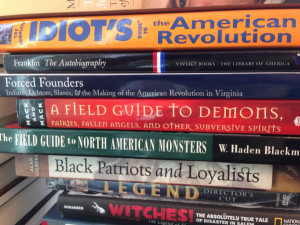READERS: As a reader, do you find book discussion guides helpful? Do book discussion guides encourage book clubs to select a book?
WRITERS: As an author, have you ever created a novel discussion guide for readers? Would such questions be more of a benefit for a series versus a single title book?


I have done book discussion guides for some of my books, and I offer them via a link on my website. However, I don’t know that anyone cares, and so I have decided to spend my time elsewhere hereafter. On my blog, I posted a more general book discussion guide that can apply to any novel: https://nancyjcohen.wordpress.com/2015/04/27/book-club-discussion-guide/
Thanks for the link, Nancy, and your insight.
I’ve found some books benefit from discussion questions, like YA books, for example. But your solution of developing a more generic list and posting that to your website is a good one. Thank you.
As a book club discussion leader, I find the reader questions make my job much easier. As a writer, I’ve discovered if I write the discussion questions right after finishing the first draft, it helps me “see” if I hit my theme.
Hi, Patricia. Great tip on writing the list of questions while the book is fresh in your mind. I found that, too. Thank you.
Argh!!! Takes me right back to high school. I want to enjoy the book and see what I see, not what someone else thinks I should get out of it. But then, I don’t read or write what are considered “book club” books. So, no to both questions. I belong to a book club, and we just talk about what we liked and didn’t like about the book, and score it from 1-10. Discussions (and scores) go all over the place, and I think if we were “directed” by questions, it would be stifling.
Hey there, Terry.
I think of discussion questions as suggestions. Group leaders can write their own, or the group can dictate how any discussion goes. So you bring up good points.
It’s not easy to create a handful of open ended questions that can stir debate in a group. And like you say, not every book works well as a book club novel, depending on how the club works.
Thanks, Terry.
Our group is very informal. We read a book and talk about it. We don’t have ‘leaders.’ Someone volunteers to go first, and then the fun begins. I find it fascinating because I’m the only writer there, and I love seeing how “readers” read. And a lot of them do dig for the themes, and symbols, and all the stuff that sends me running for the hills. Some take copious notes, quote passages; others say, “I loved/couldn’t stand it”
I created a discussion guide for my novel, ANGRY ENOUGH TO KILL, but it’s not on my website and probably should be. The novel, about a conspiracy of women who kill pedophiles, raises issues about both vigilantism and pedophilia, i.e., raises questions but doesn’t answer them, something that a few people have criticized, because they want to know what I, the author, think, rather than merely what the characters think…and the characters don’t all think alike.
Whether or not it’s the guide or the novel without the guide, it seems that book clubs are taking an interest in the novel. I have several upcoming meetings with book clubs (some via Skype and Google Hangouts, and couple in person). I’ll ask them what made them choose the book for their clubs.
Whether or not the guide makes any difference in sales doesn’t matter to me. So far, I don’t see floods of people buying my book. However, I’ll be doing a guide for my WIP regardless. For me, doing the guide after a few drafts and well before the manuscript is polished is a wonderful exercise: does the story and especially what happens to the vigilantes say what I want it to say? Too clearly or not clearly enough? Am I preaching or entertaining, and perhaps causing people to think about the issues and arrive at their own conclusions (I’d rather entertain and raise questions)? does the story support my themes?
In my WIP, A MILLION CLOSED EYES, I’m exploring the myriad reasons why people do nothing about childhood abuse…I hope…but have I done something else instead? I’m still plotting, and I keep on running into plot ideas that really have nothing to do with what I want the novel to say…exciting ideas, but really not suitable for this particular story.
I’m amazed at how many novice writers never really think about what their stories say about life and the world around them, and why they’re writing a particular story and not a different one, i.e., they haven’t asked themselves those questions, although when you grill them, they sometimes know but haven’t clarified their reasons. I wonder how they can create resonating characters without a sense of purpose for their writing. I think they end up creating plots rather than stories.
Am I on the right track in thinking that a writer should know why s/he’s writing a particular story?
Hi, Sheryl. Interesting comment. The subject matter of your books would make a provocative discussion on general, for sure. Having questions on your website might sway book clubs to select your novels as they do their due diligence, so great idea.
Not every author writes by theme, conciously perhaps. I tend to want the story to develop before I look back for the themes I seem to write about organically. But as I think about your question, I realize that my Sweet Justice series books were about a covert organization of international vigilantes that weren’t bound by jurisdictions because I saw a future (based on the internet becoming a predators ground) where law enforcement could change out of necessity.
I hope others will weigh in on your question. Thank you.